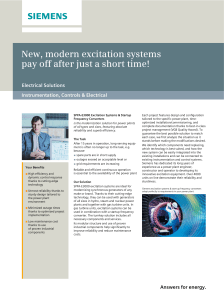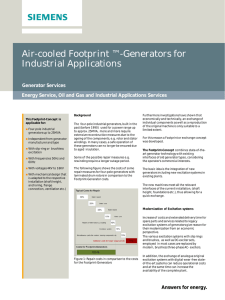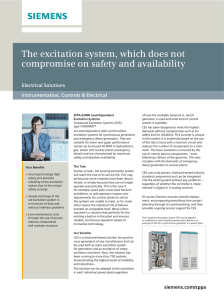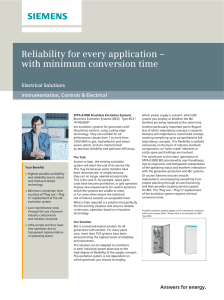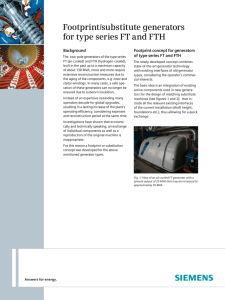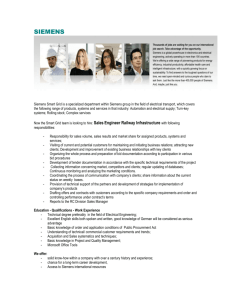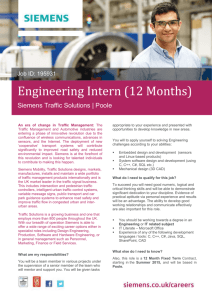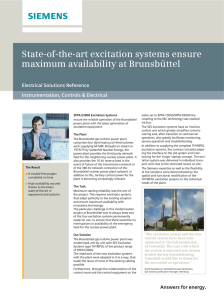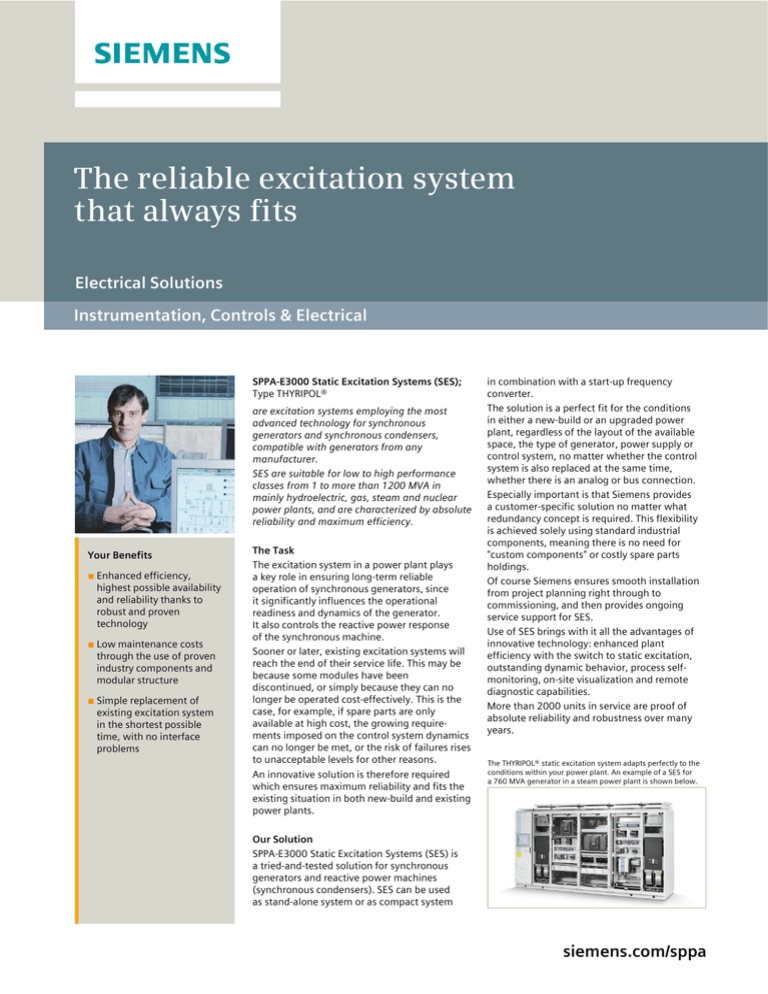
The reliable excitation system
that always fits
Electrical Solutions
Instrumentation, Controls & Electrical
SPPA-E3000 Static Excitation Systems (SES);
Type THYRIPOL®
are excitation systems employing the most
advanced technology for synchronous
generators and synchronous condensers,
compatible with generators from any
manufacturer.
SES are suitable for low to high performance
classes from 1 to more than 1200 MVA in
mainly hydroelectric, gas, steam and nuclear
power plants, and are characterized by absolute
reliability and maximum efficiency.
Your Benefits
■ Enhanced efficiency,
highest possible availability
and reliability thanks to
robust and proven
technology
■ Low maintenance costs
through the use of proven
industry components and
modular structure
■ Simple replacement of
existing excitation system
in the shortest possible
time, with no interface
problems
The Task
The excitation system in a power plant plays
a key role in ensuring long-term reliable
operation of synchronous generators, since
it significantly influences the operational
readiness and dynamics of the generator.
It also controls the reactive power response
of the synchronous machine.
Sooner or later, existing excitation systems will
reach the end of their service life. This may be
because some modules have been
discontinued, or simply because they can no
longer be operated cost-effectively. This is the
case, for example, if spare parts are only
available at high cost, the growing requirements imposed on the control system dynamics
can no longer be met, or the risk of failures rises
to unacceptable levels for other reasons.
An innovative solution is therefore required
which ensures maximum reliability and fits the
existing situation in both new-build and existing
power plants.
in combination with a start-up frequency
converter.
The solution is a perfect fit for the conditions
in either a new-build or an upgraded power
plant, regardless of the layout of the available
space, the type of generator, power supply or
control system, no matter whether the control
system is also replaced at the same time,
whether there is an analog or bus connection.
Especially important is that Siemens provides
a customer-specific solution no matter what
redundancy concept is required. This flexibility
is achieved solely using standard industrial
components, meaning there is no need for
"custom components" or costly spare parts
holdings.
Of course Siemens ensures smooth installation
from project planning right through to
commissioning, and then provides ongoing
service support for SES.
Use of SES brings with it all the advantages of
innovative technology: enhanced plant
efficiency with the switch to static excitation,
outstanding dynamic behavior, process selfmonitoring, on-site visualization and remote
diagnostic capabilities.
More than 2000 units in service are proof of
absolute reliability and robustness over many
years.
The THYRIPOL® static excitation system adapts perfectly to the
conditions within your power plant. An example of a SES for
a 760 MVA generator in a steam power plant is shown below.
Our Solution
SPPA-E3000 Static Excitation Systems (SES) is
a tried-and-tested solution for synchronous
generators and reactive power machines
(synchronous condensers). SES can be used
as stand-alone system or as compact system
siemens.com/sppa
Published by and copyright © 2015:
Siemens AG
Power and Gas Division
Freyeslebenstrasse 1
91058 Erlangen, Germany
For more information contact
sppa-e3000.energy@siemens.com
www.siemens.com/energy/sppa-e3000
Siemens Energy, Inc.
Instrumentation, Controls, & Electrical
1345 Ridgeland Parkway, Suite 116
Alpharetta, GA 30004, USA
E3071_FS_21_SES_e_V2-2
Order no. E50001-G230-A189-V1-4A00
Printed in Germany
Dispo 05401
Printed on elementary chlorine-free
bleached paper.
Unrestricted
AL:N ECCN:N
All rights reserved.
Trademarks mentioned in this document are
the property of Siemens AG, its affiliates, or
their respective owners.
Subject to change without prior notice.
The information in this document contains
general descriptions of the technical options
available, which may not apply in all cases.
The required technical options should
therefore be specified in the contract.

